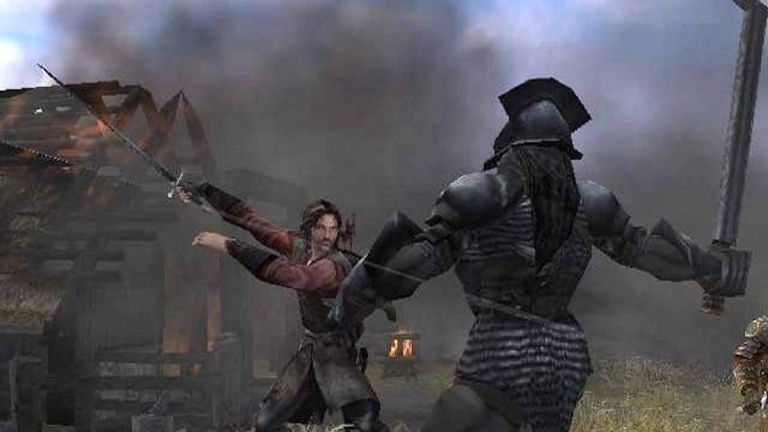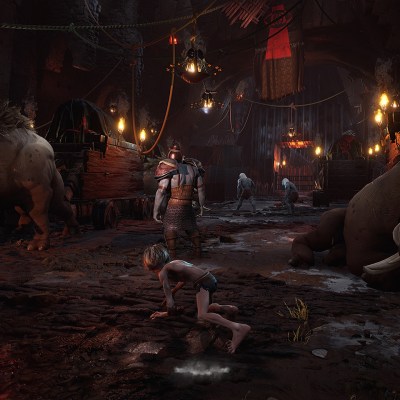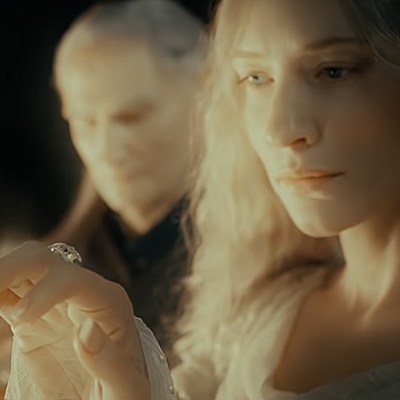Dark Alliance Reminds Us We Need a Lord of the Rings: The Two Towers Remaster
It's hard to play a modern fantasy hack-and-slash like Dungeons and Dragons: Dark Alliance and not remember the simple brilliance of The Lord of the Rings: The Two Towers.

The verdict on the recently released Dungeons and Dragons: Dark Alliance is still being decided as fans and critics finally get their hands on the highly-anticipated Action-RPG, but you’re not alone if the mere thought of the game has you dreaming of a Lord of the Rings: The Two Towers remaster.
Released in October 2002 (a couple of months ahead of the film it shares a name with), Lord of The Rings: The Two Towers was a hack and slash action game eventually available for PlayStation 2, Xbox, and GameCube as well as Game Boy Advance and even cell phones. The story goes that publisher EA and developer Stormfront Studios were supposed to make a similar game based on Fellowship of the Ring, but in 2001, all parties involved realized that the game wouldn’t be finished in time for the movie’s global release. As such, the work that had gone into that title was carried over to an adaptation of The Two Towers.
We have to stop there for a second. See, it’s pretty hard to separate the Two Towers game from the Lord of the Rings films, and not just for the positive reasons you probably think of when you remember that game. While 2002 wasn’t quite the darkest time for video game adaptations of TV shows and movies, many gamers had been burned by half-hearted adaptations too many times before to be inherently excited about the idea of “living the movie” that we were still being sold on. There were some circles in which the mere mention of a Lord of the Rings game based on the beloved movie drew hesitant sighs and concerned groans.
However, you also have to understand just how big The Lord of the Rings was at that time. Prior to Fellowship‘s premiere, the odds were good that you either grew up with the books and thought there was no way that the movies could do them justice, or you had never read the books but were feeling cynical about the idea of another franchise blockbuster after The Phantom Menance. In either case, what many of us saw when we first saw Fellowship of the Ring could only be described as magical.
The Two Towers obviously benefited from its association with a property that had ignited the imagination and spirits of film fans across the world, but one of the most fascinating things about the game wasn’t just that it would feature levels, characters, and footage from 2001’s Fellowship of the Ring but 2002’s The Two Towers as well. That meant Two Towers players would actually get to see and play parts of The Two Towers movie two months before it was released in theaters for a global audience.
It was kind of a gimmick, but it was a great one. Much like Enter the Matrix, The Two Towers initially sold itself on the promise of not just letting us dive into a world we loved but actually showing us parts of that world we hadn’t seen before. For a generation in awe that was still processing the grandeur and impact of Fellowship of the Ring, this was more than we could have ever dared ask for. It would have been enough if the games treated the source material with respect (which they did) but to offer us a preview of the movie we stayed up at night thinking of? It was an idea so far beyond what so many of us wanted: an excuse to be in that world for just a little longer and maybe even have our own adventure while we were there.
Yet, when I think back on the Two Towers or hope for a re-release, I rarely dwell on the ways that the game innovated. Honestly, I more often find myself thinking back on the ways that the game was so wonderfully simple and even familiar.
Honestly, there’s not a lot that separates Two Towers from Double Dragon, the Teenage Mutant Ninja Turtles arcade games, and so many beat ’em ups of the golden era of that genre. In all cases, the premise is rather simple. You walk across linear, but often beautiful, levels and mash a few buttons to wail on the various enemies in your path. You may have to throw in a special attack here and there (and Two Towers utilized a basic character upgrade and experience system for good measure), but the formula is pretty much the same as it ever was.
Compared to something like 2001’s Baldur’s Gate: Dark Alliance, Two Towers was almost comically simple. In fact, I can remember some at the time referring to the game as a watered-down version of those more Diablo-like experiences. Honestly, it wasn’t an entirely unfair criticism if you were determined to stack those games side-by-side based on a few similarities. Games like Dark Alliance offered dozens (or more) hours of rich action-RPG gameplay in lush fantasy settings, and Two Towers could be beaten in a handful of hours with relatively little skill or effort.
Furthermore, it always felt a bit strange to boil The Lord of the Rings down to action sequences. The movies absolutely took the action scenes from the books to a new level, but the games made little to no effort to recreate or expand the more subtle storytelling and character-building elements that really made the books and movies everything they were. Just about any modern critique of The Two Towers game written by someone who has no nostalgia for the game would likely (and perhaps rightfully) focus on the game’s simple combat, abbreviated storytelling, and all-around basic nature.
Years later, though, that’s actually the aspect of the game that I feel has aged best throughout the years. I could rant about how Two Towers‘ short, sweet, and complete design is a breath of fresh air compared to the onslaught of open-world games that seem to secretly want to be live service titles, but the beauty of The Two Towers isn’t the idea it’s somehow this bastion of noble game design. It’s more about how it so perfectly represents the idea that a good beat ’em up never really grows old. From the original genre innovators to modern throwbacks and even those titles that tried to do a bit more with the genre (such as Rockstar’s brilliant The Warriors), these games offer a kind of simple pleasure that sadly seems to be harder to justify at a time of escalation in game production.
Mostly, though, fond memories of The Two Towers are rightfully often rooted in the thrill of experiencing a loving tribute to the early Lord of the Rings movies with friends. It’s been said that it’s easier to make a game where the joy of playing with others allows you to overlook game design elements that would otherwise bug you, and maybe there’s some truth to that. Even negative reviews of Dungeons and Dragons: Dark Alliance published so far tend to mention that the game can still be a good time when played with others. It’s just more fun to play with friends, and you could certainly argue that there have been game developers who rely on that quality to sell games that would otherwise be unappealing.
The thing that’s easy to love about Two Towers is how openly it embraces that philosophy. The game isn’t trying to be much more than it is by forcing in systems and mechanics that ultimately bloat what the game actually does so well. Just about any gamer of any skill level with a friend by their side, an extra controller, and a love for The Lord of the Rings movies can hop into Two Towers and experience exactly what that game was meant to provide: a simply fun time designed to make you celebrate this thing you love and not feel exploited.
That’s what makes the fact that we’ll probably never get a remaster or remake of the Two Towers (or its exceptional follow-up, Return of the King) due to the complicated nature of the licenses involved so upsetting. WB mostly controls the rights to Lord of the Rings games now, and even if they were willing to allow EA to remaster or remake these games, it’s not entirely clear how that process would work or how much of the original games’ film footage and “DVD” extras could be retained. It’s always tragic when licensing gets in the way of our ability to enjoy a gaming experience, and it’s especially sad when licensing impacts our ability to enjoy a game that not only celebrated its license but gave many of us reason to believe in licensed games again.
Yet, I refuse to give up hope. As we near the 20th anniversary of Fellowship of the Ring later this year and the 20th anniversary of The Two Towers‘ game next year, now feels like the perfect time to revive these classic hacks and slash beat ’em ups. Without them, a new generation of Lord of the Rings fans must rely on dwindling backward compatibility support and emulations just so the idea of a simply enjoyable Lord of the Rings game easily shared with friends doesn’t go from history to legend and legend to myth as much that once was in gaming becomes lost.


